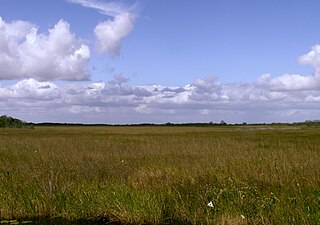
The Everglades is a natural region of flooded grasslands in the southern portion of the U.S. state of Florida, comprising the southern half of a large drainage basin within the Neotropical realm. The system begins near Orlando with the Kissimmee River, which discharges into the vast but shallow Lake Okeechobee. Water leaving the lake in the wet season forms a slow-moving river 60 miles (97 km) wide and over 100 miles (160 km) long, flowing southward across a limestone shelf to Florida Bay at the southern end of the state. The Everglades experiences a wide range of weather patterns, from frequent flooding in the wet season to drought in the dry season. Throughout the 20th century, the Everglades suffered significant loss of habitat and environmental degradation.

Everglades National Park is an American national park that protects the southern twenty percent of the original Everglades in Florida. The park is the largest tropical wilderness in the United States and the largest wilderness of any kind east of the Mississippi River. An average of one million people visit the park each year. Everglades is the third-largest national park in the contiguous United States after Death Valley and Yellowstone. UNESCO declared the Everglades & Dry Tortugas Biosphere Reserve in 1976 and listed the park as a World Heritage Site in 1979, and the Ramsar Convention included the park on its list of Wetlands of International Importance in 1987. Everglades is one of only three locations in the world to appear on all three lists.

Marjory Stoneman Douglas was an American journalist, author, women's suffrage advocate, and conservationist known for her staunch defense of the Everglades against efforts to drain it and reclaim land for development. Moving to Miami as a young woman to work for The Miami Herald, she became a freelance writer, producing over one hundred short stories that were published in popular magazines. Her most influential work was the book The Everglades: River of Grass (1947), which redefined the popular conception of the Everglades as a treasured river instead of a worthless swamp. Its impact has been compared to that of Rachel Carson's influential book Silent Spring (1962). Her books, stories, and journalism career brought her influence in Miami, enabling her to advance her causes.
William Hervey Allen Jr. was an American educator, poet, and writer. He is best known for his work Anthony Adverse, regarded by many critics "as the model and precursor of the contemporary American historical novel."

Marjory Stoneman Douglas High School is a public high school in Parkland, Florida, United States. It was established in 1990 and is part of the Broward County Public Schools district. It is named after the writer Marjory Stoneman Douglas and is the only public high school in Parkland, serving almost all of the limits of that city as well as a section of Coral Springs.
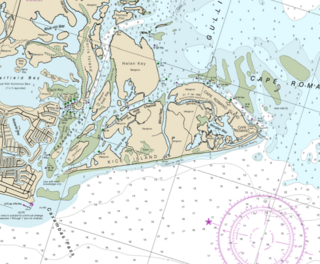
Cape Romano is a cape on the Gulf Coast of Florida, United States. It is on Cape Romano Island, one of a group of islands known collectively as Kice-Morgan Island.
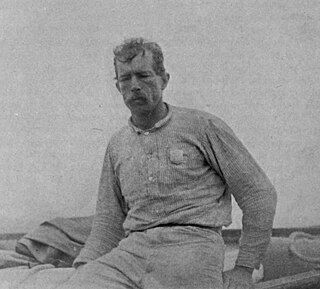
Guy Morrell Bradley was an American game warden and deputy sheriff for Monroe County, Florida. Born in Chicago, Illinois, he relocated to Florida with his family when he was young. As a boy, he often served as guide to visiting fishermen and plume hunters, although he later denounced poaching after legislation was passed to protect the dwindling number of birds. In 1902, Bradley was hired by the American Ornithologists' Union, at the request of the Florida Audubon Society, to become one of the country's first game wardens.

The Everglades: River of Grass is a non-fiction book written by Marjory Stoneman Douglas in 1947. Published the same year as the formal opening of Everglades National Park, the book was a call to attention about the degrading quality of life in the Everglades and remains an influential book on nature conservation as well as a reference for information on South Florida. It was used as recently as 2007 by The New York Times.
The indigenous people of the Everglades region arrived in the Florida peninsula of what is now the United States approximately 14,000 to 15,000 years ago, probably following large game. The Paleo-Indians found an arid landscape that supported plants and animals adapted to prairie and xeric scrub conditions. Large animals became extinct in Florida around 11,000 years ago.

A national push for expansion and progress toward the latter part of the 19th century stimulated interest in draining the Everglades, a region of tropical wetlands in southern Florida, for agricultural use. According to historians, "From the middle of the nineteenth century to the middle of the twentieth century, the United States went through a period in which wetland removal was not questioned. Indeed, it was considered the proper thing to do."

Strapping refers to the use of a strap as an implement of corporal punishment. It is typically a broad and heavy strip of leather, often with a hard handle, the more flexible 'blade' being applied to the offender.

An ongoing effort to remedy damage inflicted during the 20th century on the Everglades, a region of tropical wetlands in southern Florida, is the most expensive and comprehensive environmental repair attempt in history. The degradation of the Everglades became an issue in the United States in the early 1970s after a proposal to construct an airport in the Big Cypress Swamp. Studies indicated the airport would have destroyed the ecosystem in South Florida and Everglades National Park. After decades of destructive practices, both state and federal agencies are looking for ways to balance the needs of the natural environment in South Florida with urban and agricultural centers that have recently and rapidly grown in and near the Everglades.
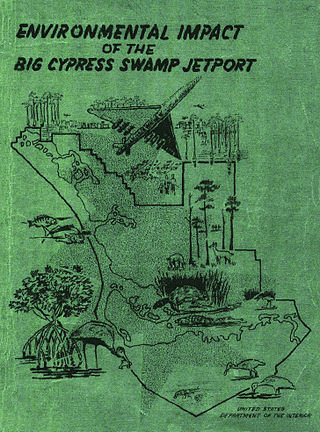
The "Environmental Impact of the Big Cypress Swamp Jetport", unofficially known as the "Leopold Report" or the "Leopold-Marshall Report", was a report authored by hydrologist Luna Leopold of the United States Geological Service for the Department of the Interior and officially released on September 17, 1969. Arthur R. Marshall, formerly of the United States Fish and Wildlife Service, helped draft the report. It is considered the first ecological impact report in the state of Florida.
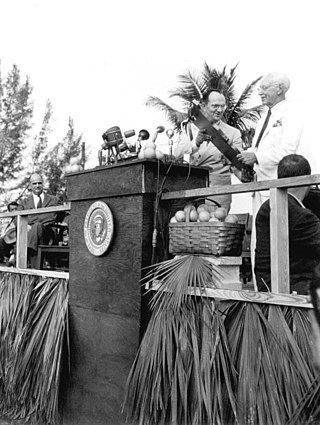
Ernest Francis Coe, also "Tom Coe" was an American landscape designer who envisioned a national park dedicated to the preservation of the Everglades, culminating in the establishment of Everglades National Park. Coe was born and spent most of his life in Connecticut as a professional gardener, moving to Miami at age 60. He was enormously impressed with the Everglades and became one of several South Florida-based naturalists who grew concerned for the wanton destruction of plants, animals, and natural water flow in the name of progress and prosperity. Coe worked for more than 20 years to get Everglades National Park established, but he viewed the effort as mostly a failure. However, Oscar L. Chapman, former Secretary of the Interior, stated "Ernest Coe's many years of effective and unselfish efforts to save the Everglades earned him a place among the immortals of the National Park movement."
The Everglades are wetlands in southern Florida, USA.
Joe Bartles Browder was an American environmental activist who spearheaded ongoing efforts to save the Florida Everglades. He was considered to be a global environmental advocate. He was an advisor on energy, climate change, environmental policy to public-interest groups, foundations, auto and energy companies, other businesses, Native American tribes and government agencies. He started out his career as a television news reporter, an active volunteer and later a paid representative for Audubon. No one can be credited more, within a non-political conservation establishment, for the national environmental movement taking the country from the first Earth Day to the election of Jimmy Carter, for whom Browder was an early companion in the early days of Florida primary campaigning
Friends of the Everglades is a conservationist and activist organization in the United States whose mission is to "preserve, protect, and restore the only Everglades in the world." The book Biosphere 2000: Protecting Our Global Environment refers to Friends of the Everglades as an organization that has fought to preserve North America's only subtropical wetland.
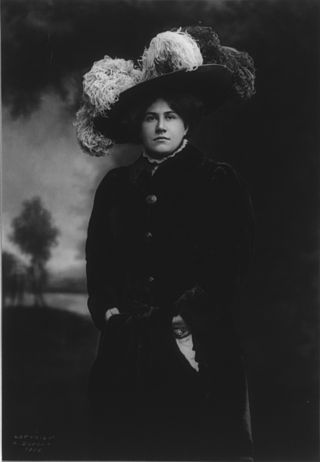
Plume hunting is the hunting of wild birds to harvest their feathers, especially the more decorative plumes which were sold for use as ornamentation, particularly in hat-making (millinery). The movement against the plume trade in the United Kingdom was led by Etta Lemon, Eliza Phillips, Emily Williamson, and other women and led to the establishment of the Royal Society for the Protection of Birds. The feather trade was at its height in the late 19th and was brought to an end in the early 20th century.
Juanita Greene was an American journalist and conservationist. She worked for the Miami Herald as a reporter and wrote about Everglades National Park and Biscayne National Park. She was the Herald's first environmental reporter.

Mary Barr Munroe was a Scottish-born American clubwoman and conservationist, based in Miami, Florida. Munroe founded the Coconut Grove Audubon Society and library, and worked for the establishment of a state park that became part of the Everglades National Park.














